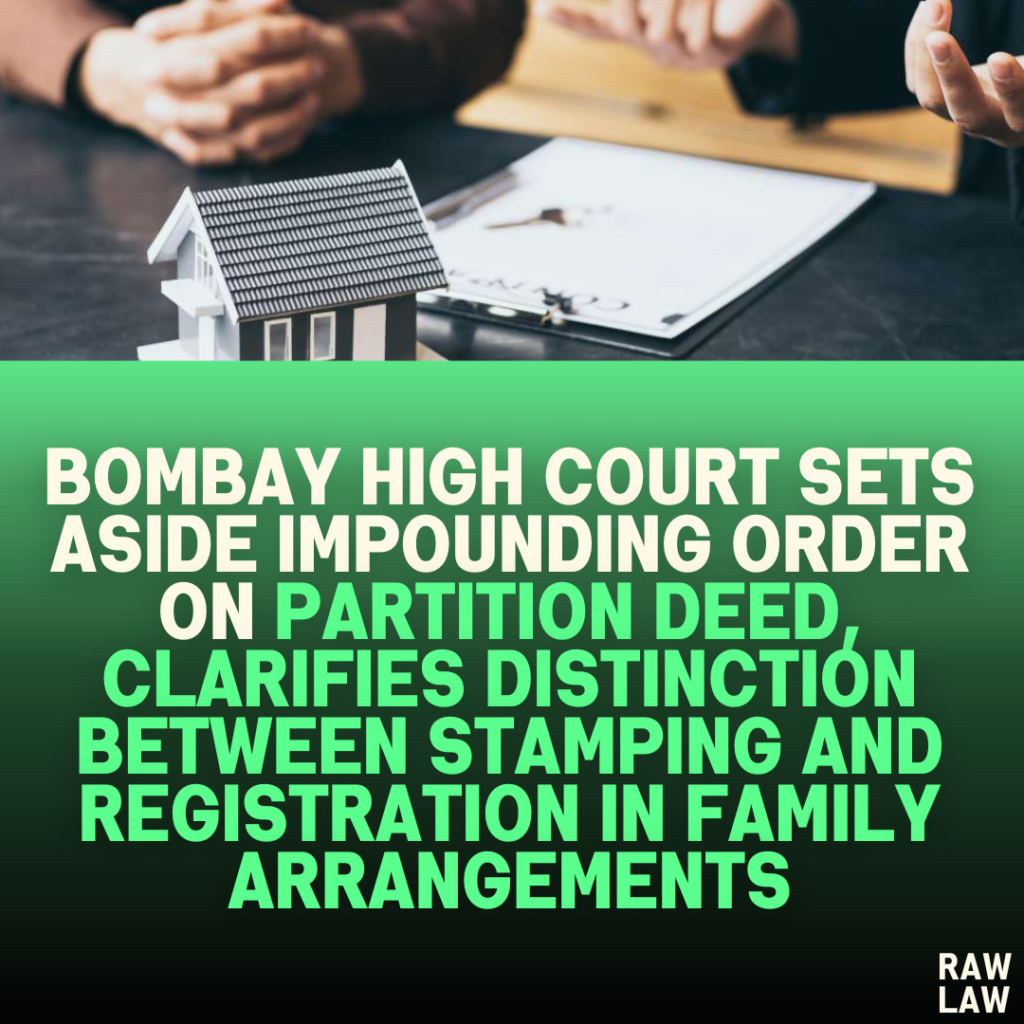Court’s Decision:
The Bombay High Court ruled in favor of the petitioner by setting aside the trial court’s order, which had impounded an unregistered partition deed and forwarded it to the Collector of Stamps for the collection of additional stamp duty and penalties. The High Court clarified that the document, a “Noting of Partition by Way of Family Arrangement,” did not necessitate registration and should not be considered a release deed. It held that the trial court had erred in requiring additional stamp duty under Article 46 of the Maharashtra Stamp Act for an unregistered document concerning the partition of family property. The High Court also directed a refund of any stamp duty or penalty paid by the petitioner.
Facts:
The petitioner had presented an unregistered partition deed in a suit for partition and declaration, claiming exclusive ownership of specific lands based on a family arrangement from 2013. The plaintiffs, however, contested the partition deed, alleging it was not binding upon them. During cross-examination, the petitioner presented the unregistered deed as evidence, which led the trial court to impound it and send it to the Collector of Stamps to ascertain stamp duty and penalties. The Collector subsequently issued a demand for additional stamp duty and penalty, which became the subject of this writ petition.
Issues:
- Was the trial court justified in sending the unregistered partition deed to the Collector for stamp duty assessment and penalty?
- Should the partition deed be considered a release deed requiring mandatory registration?
- Does a family arrangement require stamp duty under Article 46 of the Maharashtra Stamp Act?
Petitioner’s Arguments:
The petitioner argued that the trial court misinterpreted the nature of the document by considering it a release deed, which would require registration and additional stamp duty. The petitioner maintained that the document merely recorded a family arrangement that did not constitute a transfer and thus was not subject to registration or additional stamping requirements.
Respondent’s Arguments:
The respondent contended that the document, involving relinquishment of shares by some co-sharers, effectively acted as a release deed and therefore necessitated both registration and proper stamping under Article 46 of the Maharashtra Stamp Act. They argued that the Collector’s assessment of additional stamp duty and penalty was justified.
Analysis of the Law:
The court examined the nature of the document under Article 46 of the Maharashtra Stamp Act, highlighting that registration is only mandatory when a document explicitly transfers property ownership. The court referenced precedents, particularly the decision in Arvind Yeshwantrao Deshpande v. State of Maharashtra, which held that property received by a coparcener through partition of joint Hindu family property does not constitute a transfer and thus does not require registration. The court emphasized that stamping requirements are distinct from registration requirements.
Precedent Analysis:
The court relied on prior judgments, including Arvind Yeshwantrao Deshpande v. State of Maharashtra and Manikchand Hiralal Nahar & Ors. v. State of Maharashtra, which established that partition deeds within a family do not necessitate registration or additional stamp duty. The court also reviewed The Barshi Bar Association v. State of Maharashtra, which reinforced that registration is not obligatory for family arrangements. The court found these precedents consistent with the interpretation that the document did not constitute a release deed requiring mandatory registration.
Court’s Reasoning:
The court observed that the trial court had erroneously conflated stamping and registration requirements, directing impounding based on the mistaken assumption that the document created new rights. The High Court clarified that the document’s nature did not qualify as a release deed and therefore did not fall under Article 46 requirements. The court concluded that the trial court’s rationale lacked legal grounds, as there was no provision under the Maharashtra Stamp Act compelling registration of a document simply noting family arrangement.
Conclusion:
The Bombay High Court ruled that the trial court’s impounding order and the Collector’s subsequent stamp duty assessment and penalties were unsustainable. It directed the trial court to admit the document as evidence, provided it meets other evidentiary standards, and ordered a refund of any paid stamp duty and penalties.
Implications:
This ruling reinforces the legal distinction between family arrangements and release deeds, underscoring that not all partition deeds require registration or additional stamp duty. It further clarifies the application of Article 46 of the Maharashtra Stamp Act and affirms that stamping requirements for family arrangements should not be equated with transfer deeds involving third parties, thus providing a significant precedent for similar cases in family property disputes.



